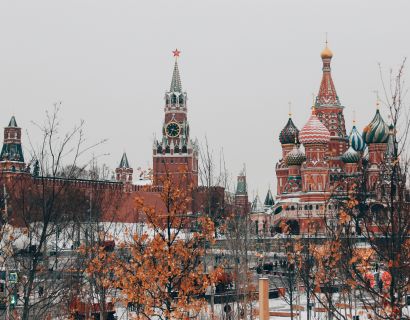Everything for  Business
Business
 Business
Business
 Business
Business
Nearly six months after Russia was evicted from much of the world's finances by invading Ukraine, it is going itself, developing a two-tier system divorced from adversaries.

Investors from countries that have not imposed sanctions gain access
Isolated after the invasion, Russia is rebuilding its financial system
Nearly six months after Russia was evicted from much of the world's finances by invading Ukraine, it is going itself, developing a two-tier system divorced from adversaries.
The plan, stemming from the central bank's proposals and the gradual easing of local restrictions, will focus on mobilizing capital domestically while serving jurisdictions it deems friendly.
From Monday, the Moscow Exchange will allow trading in debt securities for investors from countries that have not joined the sanctions imposed by the United States and its allies. The decision ended a break in work as Russia closed its markets to restrict the flow of money out of the country when the war began in late February.
But the renewal will not apply to customers from "unfriendly" countries, who are still subject to capital controls prohibiting foreigners from selling or collecting payments on local securities. This group, which includes countries from members of the European Union to Canada and Japan, accounted for about 90% of the total portfolio investment in Russia as of last year.
"In the beginning, it was necessary capital controls to stabilise the situation," said Christopher Granville, managing director of global policy research at TS Lombard in London. "But now it's more a matter of principle not to relax while these unprecedented sanctions from the West are in place."
This is the latest example of Russia taking an increasingly tough stance, separating friend from enemy.
This month, President Vladimir Putin banned some foreign banks and energy companies from doing business in the country. Another decree allowed Russian creditors with frozen foreign currency to stop transactions with corporate clients in these currencies. And Russia's sovereign wealth fund can now invest in the currencies of countries such as China, India and Turkey, after fines blocked purchases of euros and dollars.
"Given the circumstances, it will be necessary to develop trade and financial relations with those countries that are willing to do so with Russia," said Oleg Vyugin, a former senior official at Russia's central bank and finance ministry.
Finance emerged as a new front against Russia almost immediately after Putin ordered his military to enter Ukraine on Feb. 24.
To punish the Kremlin, foreign governments have imposed sanctions on trade and finance, frozen about half of their central bank's reserves, and withdrawn many of their banks from the global SWIFT messaging system.
Unable to intervene to protect the ruble with only the yuan and gold, the central bank imposed capital controls and other emergency measures to reassure investors.
But Russia is turning the page now that domestic markets seem to have weathered the storm.
Windfall energy revenues and a collapse in imports helped the ruble bounce back, allowing authorities to lift restrictions on capital controls. Local bond yields have returned to pre-war levels.
It is unclear how the partial reopening of the domestic market on Monday will affect investors from hostile jurisdictions intending to give up their holdings of local currency debt. Even now, investors can sell their assets, albeit at low prices, according to Victor Szabo, Abrdn's fund manager in London.
As life returns to the market, authorities monitor how the financial system functions in the absence of adversaries, who accounted for more than half of Russian trade before the war and made up the vast majority of non-residents in local government bonds, known as OFZs.
To deal with what he called an "extraordinary change of circumstances," Russia's central bank has published a report for public comment outlining a host of innovations that will help.
Policymakers look for domestic sources of funding, floating concepts such as charitable bonds and participation funding.
Other proposals are aimed at dissuade businesses from using "toxic" currencies, and state-owned companies should convert their foreign exchange assets into the currencies of "friendly" countries, according to the central bank.
"The reversal of the financial system is likely to be gradual," said Sofia Donets, an economist at Renaissance Capital. "If it happens suddenly, it's going to be a big shake-up for the economy."
But even though some investors are gaining more access to domestic markets, it's also a reminder of the challenges ahead.
A year ago, non-residents from "friendly" countries accounted for only 5-10% of foreign OFZ holdings, a share that Vladimir Malinovsky from Otkritie Issledovaniya calls "insignificant".
"It's not about facilitating more offshore trade," Abrdn's Szabo said. "It's more about showing a willingness to restore some semblance of normalcy."
 What are you doing with your RV in the offseason?
What are you doing with your RV in the offseason?
 Adobe will buy online design startup Figma for $ 20 billion
Adobe will buy online design startup Figma for $ 20 billion
 To combat the gas crisis, Germany offers a new plan for cheap transit
To combat the gas crisis, Germany offers a new plan for cheap transit
 Porsche family seeks iPO buyout after tearful defeat
Porsche family seeks iPO buyout after tearful defeat
 Clubs and bars are popping up all over Manhattan, providing an alternative social hub and jobs.
Clubs and bars are popping up all over Manhattan, providing an alternative social hub and jobs.
This site uses cookies and other visitor identifiers for the convenience of each user. If you stay on our site after reading this message, it means that you have no objection to the use of these technologies. Learn more
